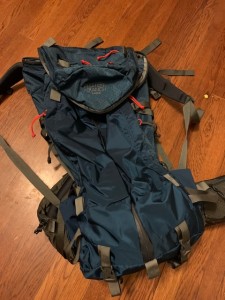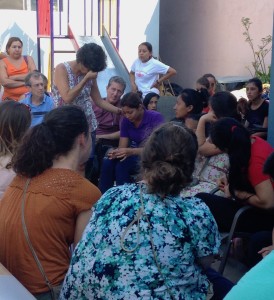 I was in the middle of a staff meeting when I felt a surge of cold run up my finger tips as they struck the keys of my computer. The cold then began to pulse through my whole body. I figured it was a mean case of the flu that was kicking in, so I just told myself to press through. This had always been my response stress, overwhelm or illness; press through.
I was in the middle of a staff meeting when I felt a surge of cold run up my finger tips as they struck the keys of my computer. The cold then began to pulse through my whole body. I figured it was a mean case of the flu that was kicking in, so I just told myself to press through. This had always been my response stress, overwhelm or illness; press through.
About 30 minutes later I realized pressing through was no longer an option. I left my office, struggled to make the 10 minute drive home and sat in my car with the heater turned on full blast as my body shook and I groaned in pain. Finally making it inside, I collapsed in bed and the symptoms continued for another hour. I felt like I was dying.
The next day I woke up telling myself it was just a freak run of the flu, began prepping for a board meeting and assembling 12-hours of speaking notes for a weekend retreat that I was leading and would fly out to the following day.
I didn’t feel great, but I boarded the plane, opened my computer to finish up my powerpoint that needed to be finished by the time the flight touched down. I’d be jumping right into two days of peacemaking training with a church leadership team and a day of Sunday sermons. But, working at 30,000 feet, I felt anything but peace. My head was starting to disassociate itself from my body. I’d drink some cold water, rub the fog out of my eyes and keep pressing through.
Thankfully, the pastor of the church I was working with that weekend is a dear friend and I told him I wasn’t feeling well. He was gracious and warm. I woke up the next morning to finish my speaking notes and could no long press through. I didn’t feel right and was starting to freak out. Am I dying of a blood infection? Do I have cancer? Am I on the edge of a heart attack? I made the mistake of going on WebMD.com which only fueled my fear. Hours from the start of the weekend retreat I had been flown in to facilitate, my pastor friend took me to the emergency room.
It seemed like they ran me through every kind of test as they struggled to identify what was going on. Finally, the doctor looked at me as said, “Your numbers all look normal. I don’t know what’s going on. Unless…have you ever struggled with anxiety or had a panic attack?”
And there it was. As soon as he said those words my brain connected with what my body had been experiencing and it’s as though my internal RMP’s went from redlining back to normal. Neurologically, something happened as my brain and body realized I wasn’t dying, while at the same time intuiting the source of my illness was deeper than any symptom found with an EKG.
————-
Turns out I had had adrenal failure and a panic attack that was fueled by a long season of underlying anxiety. Biologically speaking, cortisol (the body’s natural chemical released in high stress situations) had been slow dripping into my system for so long that my body became familiar with it. Further, I had been running off adrenaline for so long to keep up with life’s responsibilities that I simply ran out.
Over the next six months, it took all my strength and focus to accomplish the most basic tasks of work, family and life. For a guy who had never once considered himself lacking in capacity, this was deeply disorienting. Trying to explain it to co-workers and loved ones who couldn’t understand sometimes made it even worse (although they were 100% in my corner). I was finally forced to prioritize my own health as I went back to therapy, doubled down on my commitment to meeting with a spiritual director and exercised everyday.
As my late Spiritual Director, Paul Rhoads, told me, “Jon, I know it doesn’t feel like it right now, but this is all a gift. You could have kept going for 15 more years before you had this kind of opportunity to reevaluate your life. You’ve been given back 15 years of being fully present to yourself, your family and your community because of the journey toward healing you are now on.” He was right, it didn’t feel like a gift at all. It felt like weakness. It felt like vulnerability. It felt like confusion. It felt like failure.
————–
As I excavated my own story, it was as though I was going from one way of living and seeing the world in the shallow end of the pool to a deep dive into the ocean’s holy darkness and sacred depths. Things that had mattered so much to me suddenly mattered very little. Things that I hadn’t had the eyes or time to see suddenly became the focus of my path. Life went from black and white to a 3D constellation of color and light.
Simple realizations around the toxicity of the ego-driven economy of USAmerican Christianity that had constantly been begging for my fidelity.
Complex realizations involving secondary trauma that had been acquired on a molecular level from exposure and relational proximity to pain, conflict and violence.
Spiritual realizations like awakening and embracing a God who is much more associated with holy mystery than static orthodoxy.
Personal realizations that allowed me to acknowledge ways I’d prioritized efficiency and reputation over presence and authenticity.
I could go on and on, but in short, it felt like I was becoming human again. It was horrible and it was enlivening.
————–
About a year after things fell apart, I was offered a book contract by a publisher I deeply respect and on a topic that burns in me life fire. I had been working on the book idea and proposal with my literary agent for about two years, so when the contract came, we both shared a collective sigh of relief and surge of excitement.
Until something didn’t feel right.
I found ways to set aside my reservations for awhile, but then allowed them to enter into my conversations with Janny (my wife) and a few close friends. “Everything about this seems right, but am I just jumping back into the economy of ‘doing’ as a pseudo form of success and identity? Isn’t that what got me into this mess in the first place? Am I convincing myself to do this out of an overdose of ego or out of holy conviction?”
As a family, we had stated that this next season of life (outside of our work and community commitments) needed to be focused on creating space for Janny to go back to school, for me to pursue my health and for our family to learn Spanish. Writing this book didn’t accomplish any of those big three. I invited a close community of trusted friends and colleagues into the process with me to receive their honest feedback and, of course, they asked all the questions I hadn’t had the courage to ask myself. They didn’t tell me not to write the book, but they unapologetically asked me the questions that bent toward health.
The night before I was going to sign the contract and move toward writing the book (which, for me, is generally a very life giving process), I had some kind of dream. I don’t remember any of it, but I remember waking up with crystal clarity that I needed to walk away from the contact. So I did.
————–
Even though I probably wouldn’t have admitted it, I had lived so long associating success and “faithfulness” with production (the Evangelicalism that I inherited has a corner on the market for this twisted economy) that to say “no” to something like this was new territory…and it was wildly liberating. To say “no” to the very thing I love to do, but could also be a cheap substitute for the more important journey toward personal wholeness was invigorating. In a culture that often celebrates platform, smart thoughts (even if they are completely disembodied from everyday life) and sales numbers, this journey was going to take me in a different direction.
It’s much harder for me to choose to simply be present to what’s right in front of me than to be distracted by the never ending “to-do” list that I should be tending to. To sit on the floor and play with my kiddos without thinking about work, checking my phone or seeing them as a chore. To sit in silence and stillness for a few minutes before opening my computer to tackle the days work. To say NO to stuff that is really good, but not mine to do. To have the margin in my life that allows for “holy interruptions” rather than “annoying distractions.”
Like my Spiritual Director said, this season has proven to be an incredible gift. A gift I wouldn’t give back for the world. I gift I plan to keep on opening, exploring and sharing.
——————-
My book manuscript would have been due October 1st (yesterday). As soon as I turned down the contract, Janny said to me, “You’ve always wanted to walk the Camino de Santiago. Now that you won’t be using your time and energy scrambling to hit that book deadline, why don’t you go? It will be a physical journey symbolic of the journey you are on in your own life.”
She’s a remarkable woman. Really. Like, I can’t imagine any spouse with four little kids ever uttering those words. But she did, and despite my initial hesitation, I went for it.
A pilgrimage is not about the destination; it’s about the transformation along the way. Kinda like life. This pilgrimage is one of three sacred to those of us in the Christian tradition. The other two are Rome and Jerusalem, both of which I’ve been to multiple times. This pilgrimage will be different though. I’m the same person, but in a much different season and view of life.
I’m walking with Saint Francis who walked this path hundreds of years ago. He was a saint who embodied so much of what I now hold in high esteem; love, compassion, tenderness, simplicity and peace.
I’m walking with Paul Rhoads, my Spiritual Director who navigated these past few years with me as I unraveled so much of my story. He tragically died two months ago and I wondered if I should even go on the Camino without his guidance. Now, I’m trusting he gave to me all the guidance I need. He gave me all he had and now it’s my turn to live into it.
I’m walking with an open ear for the Spirit to speak (or guide) through fellow pilgrims, the creatures on the trail, the rhythm of my boots or the wanderings of my mind and soul.
I’m walking with my family who sends me to continue on my journey of becoming. As I type this, I’m home alone with the kiddos as Janny is in Canada for a school intensive. I hope they will see their parents commitment to continually growing and expanding as part of a living, breathing faith rather than one that becomes static with time and toil. I want to live the kind of life I’d hope for them to live someday.
I’m walking with all my beauty and all my brokenness. No doubt the residue of past hurt, trauma and disappointment will surface along the way. I want to be open to it, listen long and explore a way through it. No doubt the beautiful will also rise and fuel each stride as I think of all who have gone before to create these moments of introspection.
So, I fly out on Saturday. Just me, my backpack and a journal.
See you later and Buen Camino!
 I was in the middle of a staff meeting when I felt a surge of cold run up my finger tips as they struck the keys of my computer. The cold then began to pulse through my whole body. I figured it was a mean case of the flu that was kicking in, so I just told myself to press through. This had always been my response stress, overwhelm or illness; press through.
I was in the middle of a staff meeting when I felt a surge of cold run up my finger tips as they struck the keys of my computer. The cold then began to pulse through my whole body. I figured it was a mean case of the flu that was kicking in, so I just told myself to press through. This had always been my response stress, overwhelm or illness; press through. I was in the middle of a staff meeting when I felt a surge of cold run up my finger tips as they struck the keys of my computer. The cold then began to pulse through my whole body. I figured it was a mean case of the flu that was kicking in, so I just told myself to press through. This had always been my response stress, overwhelm or illness; press through.
I was in the middle of a staff meeting when I felt a surge of cold run up my finger tips as they struck the keys of my computer. The cold then began to pulse through my whole body. I figured it was a mean case of the flu that was kicking in, so I just told myself to press through. This had always been my response stress, overwhelm or illness; press through.
 A couple thoughts on the Migrant Caravan moving through Central American and Mexico toward our border…
A couple thoughts on the Migrant Caravan moving through Central American and Mexico toward our border…